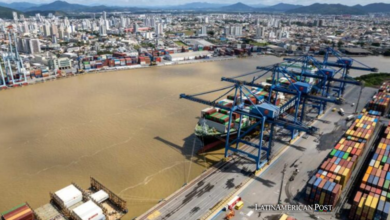How Much Should The Salary Increase After A Year Of Inflation?
In LatinAmerican Post we explain what are the variables to take into account for salary increases in a country, especially in a year as convulsed as 2022. What would happen if the salary exceeds the productive capacity of a nation?

Photo: Pixabay
LatinAmerican Post | Christopher Ramírez Hernández
Listen to this article
Leer en español: ¿Qué tanto debe aumentar el salario luego de un año de inflación?
With the arrival of December, not only the Christmas holidays also arrive, but also the typical "worry" of every year in Latin America and much of the world: how much should the minimum wage increase for next year?
It should be remembered that 2022 was not a good year in terms of economic terms, since, according to data provided by the International Monetary Fund (IMF), economic activity showed a rapid and widespread slowdown throughout the world, with inflation as a protagonist.
The European Central Bank (ECB) reminds us that inflation is nothing more than a situation, specific or worldwide, in which the supply (amount of products available) is much less than the demand (need of the people). for such products).
In short, when the economy slows down, you enter an economic crisis in which fewer products are developed than people need. This in turn “produces a general increase in prices, not just for individual items, which results in fewer goods and services being purchased for every penny today than yesterday. In other words, inflation reduces the value of the currency over time”, they explain from the ECB.
Does More Inflation Equal A Higher Minimum Wage?
According to the IMF, "the cost of living crisis, the tightening of financial conditions in most regions, the Russian invasion of Ukraine, and the persistence of the COVID-19 pandemic" have had a notable impact on the development of the inflationary situation that the world is experiencing, so, for some experts, one of the ways to counteract it is precisely by correctly adjusting the minimum wage for 2023.
For the International Labor Organization (ILO), it is clear that assessing people's cost of living (determined directly by inflation in a country) is a crucial factor in deciding whether to increase the minimum wage.
The equation is simple: the more expensive life is for a population, the higher its income should be to be able to offset the high costs of products; however, what is not easy is its execution.
YOU CAN ALSO READ: Upward devaluation: the dollar against other Latin American currencies
This is explained by the National Association of Financial Institutions (ANIF) in Colombia, which added a second variable to inflation to determine the ideal minimum wage: productivity.
For this entity, it is obvious that the results could be negative if the salary increase exceeds inflation and the productivity index in a society. What they explain from this institution is that if the minimum wage is greater than the production that is had, that is, the work done, this situation could lead to a scenario of unemployment.
"An increase in salary costs above the adjustment for inflation and the increase in productivity can impose greater barriers to formality or even hiring," said Anwar Rodríguez, vice president of ANIF, in Portafolio; that is to say: the higher the salaries and the lower the productivity in a country, the greater the risk that companies must terminate their employees, or at least limit the hiring of others, to cover the salaries of their collaborators. current.
A similar thought was expressed by Fedesarrollo, an entity from which they proposed a new hypothetical scenario that was not at all encouraging in which inflation, once again, would be the protagonist. According to this organization, when deciding to increase the minimum wage in a country, inflation should not only be considered as a present variable but also as a future one.
In short, what Fedesarrollo establishes is that incorrectly increasing wages without considering that, according to international entities, inflation will not stop next year but will continue to grow, is to fall into a vicious circle of increase upon the increase in all fields of the economy.
"Increases in the minimum wage higher than that suggested by the rule of inflation caused and productivity may generate additional upward pressure on inflation next year since a good part of these excess increases could be transferred to consumers via higher prices of final goods”, argued Luis Fernando Mejía, executive director of Fedesarrollo.
In this way, future inflation would mean that increasing the minimum wage concerning current inflation would only maintain and even worsen the problem of cost overruns: just as wages rise, the prices of essential products would also rise. basic within the family basket. Just as workers earn more, the expenses of companies that would have to raise their prices to meet their payroll obligations would also increase.
In summary, to agree on how much the minimum wage in a society should increase, it is necessary to take into account the cost of living of people (which is derived from current inflation), as well as the productivity that said people can offer and inflation to come. In case of ignoring or diminishing the importance of any of these three, the result could be harmful, with increasingly higher costs, increasingly devalued currencies, higher unemployment, and increasingly poor populations.




